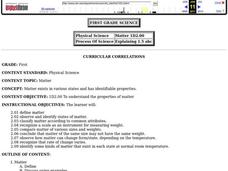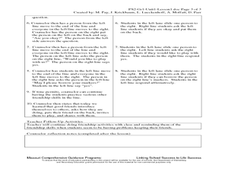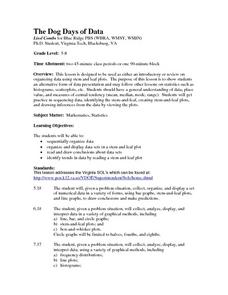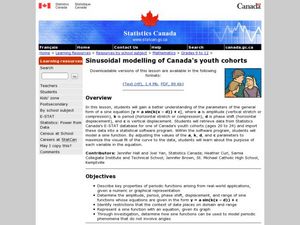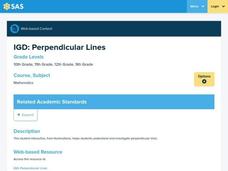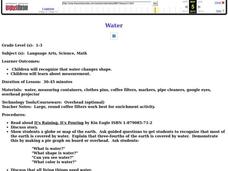Curated OER
Women in Space
Students read biographies of women who have made contributions to field of aerospace and aeronautics, choose one woman to research, and present their findings to classmates in form of essay, play, poster, or presentation.
Curated OER
Is There A Formula for People?
Students explore proportions which are typical of the human body. Given a list of classic proportions from earlier centuries, students work in pairs to test the validity of the proportions. Pupils share their personal measurements. ...
Curated OER
Make Your Own "Weather" Map
Students develop and apply a variety of strategies to solve problems, with an emphasis on multi-step and non-routine problems. They acquire confidence in using mathematics meaningfully.
Curated OER
Multicultural Math Project
Sixth graders examine where mathematics came from. In this Math History lesson, 6th graders complete various activities to understand mathematical reasoning. Students complete critical thinking questions.
Curated OER
Peat Pots
Young scholars place a peat pot in water to observe and calculate the rate of capillarity in a model of a soil. This task assesses students' abilities to make simple observations, collect, record, and represent data, use a data table to...
Curated OER
Wet-Dry Bulb Hygrometers: Measuring Relative Humidity and Apparent Temperature
Pupils work in groups of 4 for the activity/activity part of this exercise. They know that clouds are formed by the condensation of water vapor, affect weather and climate. Also that global patterns of atmospheric movement influence...
Curated OER
George and Sam Save for a Present
Third graders develop their algebraic thinking by recognizing a variety of patterns using concrete objects, numbers, tables, and pictures. In this George and Sam Save for a present lesson, 3rd graders communicate their mathematical...
Curated OER
How Deep is the Ocean
Students predict and then analyze the layout of the tectonic plates that form the ocean's floor using mapping skills and Inquiry based problem solving, They compare the depth of various regions in the ocean with the geologic age to...
Curated OER
Metric Conversions
Students translate a mathematical idea from one form to another. They compare and convert a given measurement to another unit within the same measurement system.
Curated OER
Metric Conversions
Students practice the fundamentals of converting metric measurements. They translate a mathematical idea from one form to another and compare and convert a given measurement to another unit within the same measurement system. Students...
Curated OER
Matter
First graders study and define matter. They observe and identify states of matter along with common attributes and study how matter can change form or change its state depending on temperature.
Curated OER
Fractions, Decimals, and Gravity
Students discuss how weight is directly related to gravitational force on a planet. Students then choose Space Traveler as companion and compute how much their guide weighs on various planets, based on each planet's relative surface...
Curated OER
Fly, Fly Away
Students use materials from their own environment to design a kite. For this kite design lesson, students research the history of kites and obtain a formal mathematical definition of a kite. Students sketch kite designs after discovering...
Curated OER
Algebra I Lesson
Ninth graders explore applications of Algebra. In this Algebra I lesson, studetns investigate eight applications of algebra ranging form the mathematics of roller coasters to tracking the popularity of a web site.
Curated OER
Investigating the Idea of Sin
Fifth graders use sin to solve problems involving right-angled triangles, Solve equations of the form sin(++) = a, for a between -180++ and 360++. They State and graph the value of sin(++) in special cases. They describe some of the ways...
Curated OER
Fibonacci Numbers
Students calculate the Fibonacci sequence of numbers. Through the use of Fibonacci numbers in flowers, leaves, fruits, vegetables, pine cones, and other forms of nature; students explore how Fibonacci numbers occur in nature. Then they...
Curated OER
Friendship Line Dancing
First graders explore the characteristics of being a good friend. They observe a puppet and discuss why the puppet is sad. In groups, 1st graders form two lines, facing each other. They practice talking to each person in the line,...
Curated OER
The Dog Days of Data
Students practice an alternative form of data presentation. They practice sequencing data, identifying the stem-and-leaf, creating stem-and-leaf plots, and drawing inferences from the data by viewing the plots.
Curated OER
Sinusoidal modelling of Canad'a youth cohorts
Students explore the general form of the sine equation. For this trigonometry lesson, students explore the relationship between the changing parameters and the graph of the sine equation. Students use data and a statistical...
Curated OER
Exploring Gender Bias in the Workplace
Students investigate gender bias in the work place. In this secondary mathematics lesson plan, students gather research on the current statistics about a profession which focuses on the female//male ratios and the pay scale of the...
Curated OER
Perpendicular Lines
Students differentiate between parallel and perpendicular lines. For this geometry lesson, students identify the different angles created by perpendicular lines and parallel lines. They name the angles that are form when parallel lines...
Curated OER
An Immigration Graph
Students practice reading and understanding information in a table and converting the information to graph form. They create a graph showing the number of immigrants per country of origin between 1899 and 1924.
Curated OER
TE Activity: A Roundabout Way to Mars
Students investigate Hohmann orbit transfers using cardboard and string while focusing on the orbits of Earth and Mars. They look at the planets orbits around the sun and transfer orbit form one planet to another to determine what a...
Curated OER
Water
Students complete activities to examine the properties of water. In this water science lesson, students read a book about water's forms and study a map or globe of the Earth to investigate water. Students discuss living things that need...










